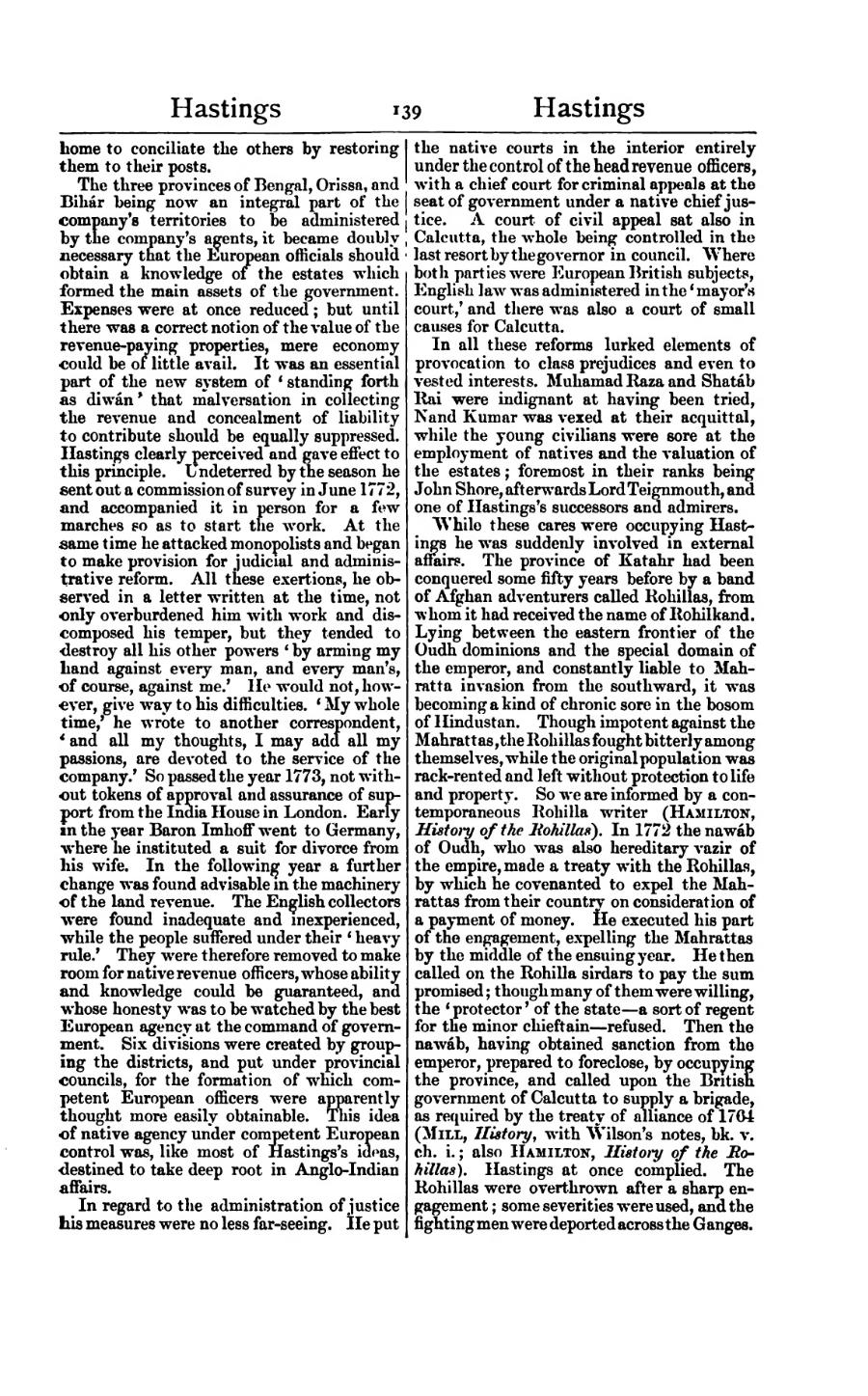home to conciliate the others by restoring them to their posts.
The three provinces of Bengal, Orissa, and Bihár being now an integral part of the company's territories to be administered by the company's agents, it became doubly necessary that the European officials should obtain a knowledge of the estates which formed the main assets of the government. Expenses were at once reduced; but until there was a correct notion of the value of the revenue-paying properties, mere economy could be of little avail. It was an essential part of the new system of ‘standing forth as diwán’ that malversation in collecting the revenue and concealment of liability to contribute should be equally suppressed. Hastings clearly perceived and gave effect to this principle. Undeterred by the season he sent out a commission of survey in June 1772, and accompanied it in person for a few marches so as to start the work. At the same time he attacked monopolists and began to make provision for judicial and administrative reform. All these exertions, he observed in a letter written at the time, not only overburdened him with work and discomposed his temper, but they tended to destroy all his other powers ‘by arming my hand against every man, and every man's, of course, against me.’ He would not, however, give way to his difficulties. ‘My whole time,’ he wrote to another correspondent, ‘and all my thoughts, I may add all my passions, are devoted to the service of the company.’ So passed the year 1773, not without tokens of approval and assurance of support from the India House in London. Early in the year Baron Imhoff went to Germany, where he instituted a suit for divorce from his wife. In the following year a further change was found advisable in the machinery of the land revenue. The English collectors were found inadequate and inexperienced, while the people suffered under their ‘heavy rule.’ They were therefore removed to make room for native revenue officers, whose ability and knowledge could be guaranteed, and whose honesty was to be watched by the best European agency at the command of government. Six divisions were created by grouping the districts, and put under provincial councils, for the formation of which competent European officers were apparently thought more easily obtainable. This idea of native agency under competent European control was, like most of Hastings's ideas, destined to take deep root in Anglo-Indian affairs.
In regard to the administration of justice his measures were no less far-seeing. He put the native courts in the interior entirely under the control of the head revenue officers, with a chief court for criminal appeals at the seat of government under a native chief justice. A court of civil appeal sat also in Calcutta, the whole being controlled in the last resort by the governor in council. Where both parties were European British subjects, English law was administered in the ‘mayor's court,’ and there was also a court of small causes for Calcutta.
In all these reforms lurked elements of provocation to class prejudices and even to vested interests. Muhamad Raza and Shatáb Rai were indignant at having been tried, Nand Kumar was vexed at their acquittal, while the young civilians were sore at the employment of natives and the valuation of the estates; foremost in their ranks being John Shore, afterwards Lord Teignmouth, and one of Hastings's successors and admirers.
While these cares were occupying Hastings he was suddenly involved in external affairs. The province of Katahr had been conquered some fifty years before by a band of Afghan adventurers called Rohillas, from whom it had received the name of Rohilkand. Lying between the eastern frontier of the Oudh dominions and the special domain of the emperor, and constantly liable to Mahratta invasion from the southward, it was becoming a kind of chronic sore in the bosom of Hindustan. Though impotent against the Mahrattas, the Rohillas fought bitterly among themselves, while the original population was rack-rented and left without protection to life and property. So we are informed by a contemporaneous Rohilla writer (Hamilton, History of the Rohillas). In 1772 the nawáb of Oudh, who was also hereditary vazir of the empire, made a treaty with the Rohillas, by which he covenanted to expel the Mahrattas from their country on consideration of a payment of money. He executed his part of the engagement, expelling the Mahrattas by the middle of the ensuing year. He then called on the Rohilla sirdars to pay the sum promised; though many of them were willing, the ‘protector’ of the state—a sort of regent for the minor chieftain—refused. Then the nawáb, having obtained sanction from the emperor, prepared to foreclose, by occupying the province, and called upon the British government of Calcutta to supply a brigade, as required by the treaty of alliance of 1764 (Mill, History, with Wilson's notes, bk. v. ch. i.; also Hamilton, History of the Rohillas). Hastings at once complied. The Rohillas were overthrown after a sharp engagement; some severities were used, and the fighting men were deported across the Ganges.
